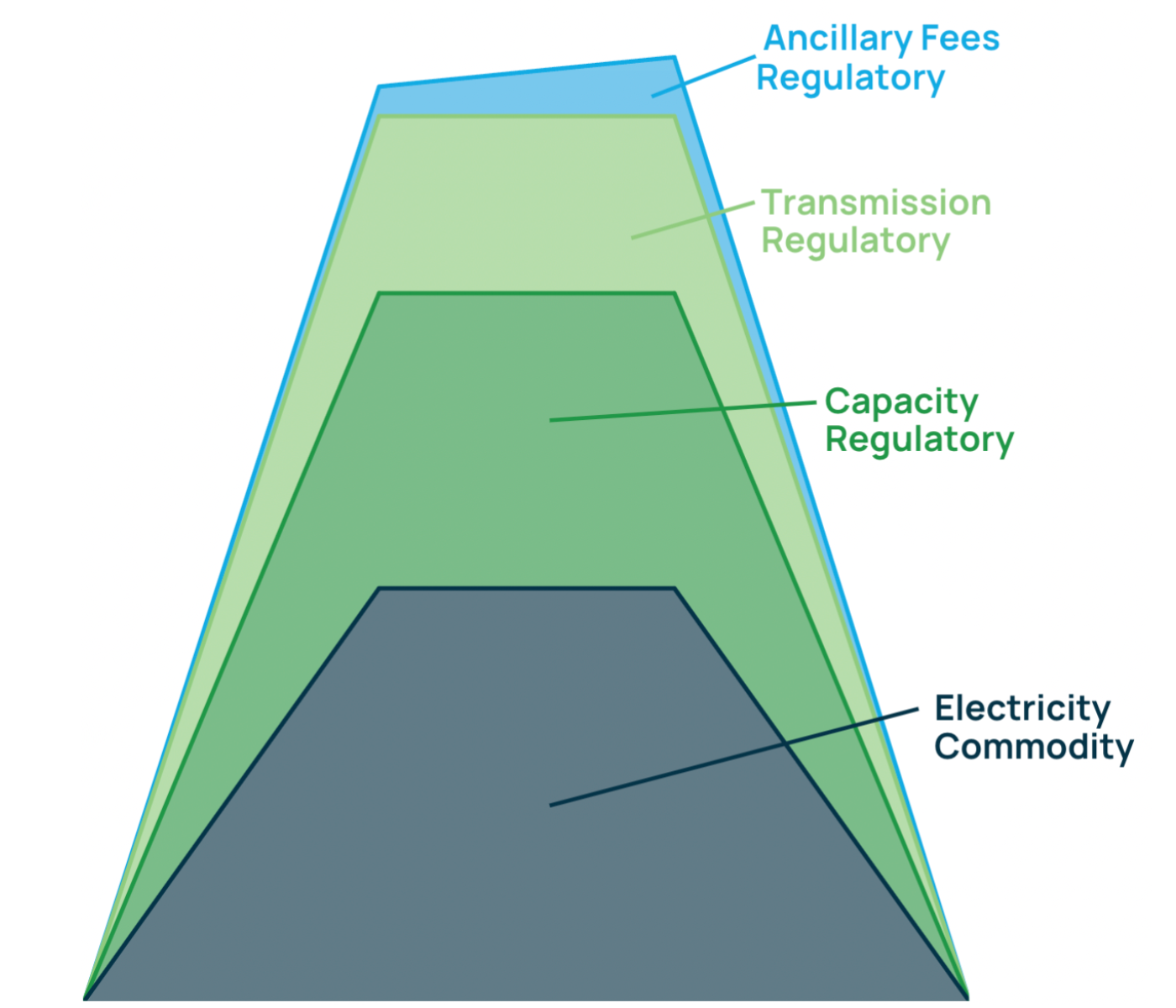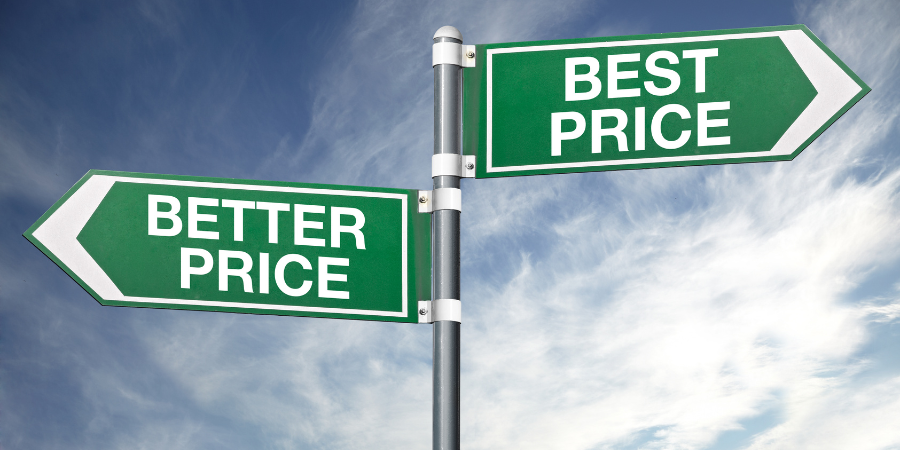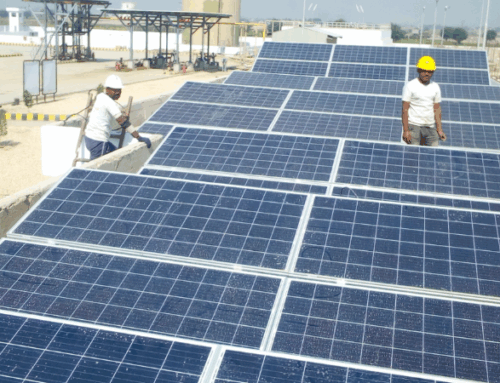If you are shopping for commercial energy plans for your business or organization and are looking for a guide on how to compare commercial energy rates, this is the last resource you will ever need. In this article, we outline how commercial energy rates are calculated and the best way to perform a true apples-to-apples comparison between retail energy supplier price offers.
Understanding The Makeup Of Your Commercial Electricity Rate
Commercial electricity rates have a few major components that determine your ultimate supply price. In most deregulated energy states, with the exception of ERCOT in Texas, commercial electric rates are comprised of energy, capacity, transmission, RPS, and ancillary charges. The chart below shows the breakdown of these costs:

Let’s further dive into the explanation of these costs:
- Electricity: The electricity component of your supply rate represents the majority of the costs and is a market-based rate. Electricity costs can be hedged in the futures market or floated in the index market. These costs are directly tied to the amount of electricity consumed at your facility.
- Capacity: Capacity costs are a regulatory charge collected by each Independent System Operator (ISO) or Regional Transmission Organization (RTO) and are calculated based on your facility’s peak demand in the summer months. Capacity money is paid to electric generators in exchange for their commitment to generate a minimum amount of electricity at any given time. These charges help to support the stability and reliability of the electric grid. In order to mitigate rising capacity costs in 2025, customers need to look for ways to shave peak demand.
- Transmission: Transmission costs are paid to transmission line owners for transmitting power from generation plants to local utility companies for final delivery. Transmission rates are a regulatory charge and are set at the utility level. This price component is a measure of your facility’s peak demand in each billing cycle.
- Ancillary: Ancillary fees are regulatory costs charged by ISOs and RTOs in an effort to stabilize the grid. Ancillary markets are comprised of regulation, spinning reserves, non-spinning reserves, voltage support, and frequency regulation. These are fees paid to generating assets to help support the balance of supply and demand on the electricity grid.
While most commercial customers elect to purchase fully-bundled fixed rates where these costs are hidden in a single price, they are still calculated and quoted by each retail electricity provider when you are shopping for commercial energy plans.
Some additional fees not mentioned above are RPS charges, or renewable portfolio standards, which help to support the integration of renewable energy into the power grid. These charges are imposed on energy suppliers to ensure they meet state-mandated renewable energy requirements by purchasing renewable energy credits (RECs) or generating renewable power. Ultimately, RPS charges are passed to customers as part of their energy costs.
Challenges With Analyzing Energy Supplier Offers
Because of the complex nature of commercial energy rates, there are many challenges that businesses face when trying to make sense of rate offers. Charges like electricity, capacity, transmission, and ancillary fees may be presented differently by suppliers, making it difficult to conduct an apples-to-apples comparison. Additionally, some suppliers may bundle certain charges into a simple-to-understand, fixed energy rate, while others do not, adding further confusion. Understanding how these components are calculated, the terms of the energy contract offer, and the impact on overall costs is critical for businesses to make informed decisions. It is always best to seek the guidance of an experienced energy broker to help you decipher multiple energy supplier offers.
Commercial Energy Rate Comparison Checklist
When comparing commercial energy rates, it’s essential to look beyond the quoted price per kilowatt-hour and understand the details of each supplier’s offer. To ensure you’re making an informed decision, consider the following key factors:
- Start with Price Components: Understand the breakdown of the rate, including electricity, capacity, transmission, RPS, and ancillary charges. This will help you identify any hidden fees or bundled costs. It is important to compare each supplier’s offer to ensure that all rates contain the same components.
- Compare Capacity Tags from Each Supplier: Capacity costs are calculated based on your facility’s peak demand in the Summer months, and different suppliers may estimate this tag differently. Ensure the assumptions align with your usage patterns, and that they are similar in each supplier offer. A high transmission tag can significantly increase the total rate offer. On the other hand, if the tag is not calculated correctly, you could be subject to a price adjustment later in your contract.
- Compare Transmission Tags from Each Supplier: Similar to capacity, transmission tags vary based on how peak demand is assessed. Verify each supplier’s approach to avoid unexpected charges or potential transmission cost adjustments.
- Check for Pass-Through Clauses for Capacity or Transmission Cost Adjustments: Some suppliers may pass through cost increases related to capacity or transmission rate changes. Ensure you understand how and when these adjustments could occur. Also, be cognizant of the fact that one supplier offer may look higher than another, but might not contain these price adjustments. Ultimately, this could lead to lower rates for your organization.
- Consider Bandwidth Usage Allotments: Review the allowable usage range specified in the contract. Exceeding or falling below this range can result in penalties or price adjustments. Typically, offers with tighter usage constraints are lower, while higher usage constraints result in higher prices. It’s important to compare this component of each supplier offer to ensure a true rate comparison.
- Check for Material Change Recourse: Understand how the supplier handles material changes in your energy usage or business operations that could impact the terms of the agreement. Some suppliers will spell out what constitutes a material change, while others will leave this language up to interpretation.
- Look at Contract Expiration Terms: Be aware of the contract’s end-of-term provisions. Does it auto-renew, switch to a variable rate, or require renegotiation?
- Check to See How the Post-Term Rate is Calculated: Some contracts revert to a default month-to-month variable rate after expiration, which could be significantly higher than your current rate. It is important to consider how the post-term rate will be calculated by the supplier. Some contract language is vague and allows the supplier to bill the rate of their choice.
- Does the Rate Include Tax?: Confirm whether the quoted rate includes taxes like Gross Receipts Tax (GRT) or Sales and Use Tax (SUT), which can vary by state and significantly affect costs. A higher offer, including GRT, might actually be lower than an offer that does not include GRT.
- How is the Rate Billed? Dual-Bill or Single Bill: Determine if you’ll receive separate bills from the supplier and utility (dual-bill) or a single combined bill, and consider which option aligns best with your preferences and administrative processes. In some states with utility purchase of receivables (POR), you can save an additional 1-3% by electing to receive a dual bill from the supplier.
By addressing these factors, you can effectively compare offers and select the energy contract that best meets your business needs.
Need Help Comparing Commercial Energy Rates?
Commercial energy rates and contracts can be complex and overwhelming, so having a trusted advisor in your corner can make all the difference. At Diversegy, our team of experienced energy professionals has over 100 years of combined experience helping our customers negotiate commercial energy prices. Contact us today to learn more about our energy broker services and to secure the best plan for your organization.



